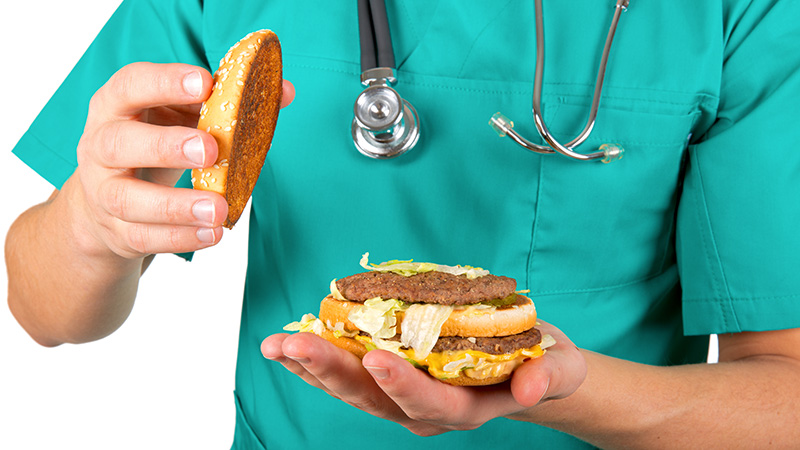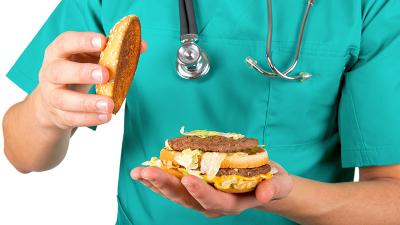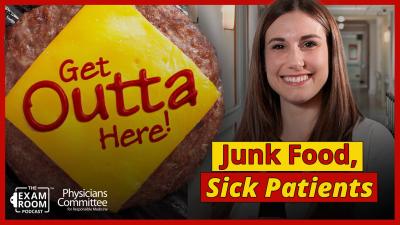Doctors Will Lead a Protest Oct. 13 Against Fast Food at JPS Hospital
On the Same Day, A Dietitian and Two Doctors Will Testify at the JPS Hospital Board of Managers Meeting
FORT WORTH, Texas—On Oct. 13, nutrition expert Anna Herby, DHSc, RD, CDE, Dallas-based cardiologist John J. Pippin, MD, FACC, and other Texas health care professionals will protest with concerned citizens in front of John Peter Smith Hospital in Fort Worth. At issue is high-fat fast food at a McDonald’s restaurant inside the hospital. After the protest, Dr. Herby, Dr. Pippin and others will testify at the hospital’s Board of Managers meeting.
The protest is coordinated by the Physicians Committee, a nonprofit with more than 17,000 physician members nationwide, including 629 Texas doctors.
The protest signs will ask passers-by to contact Karen Duncan, MD, the CEO of JPS Hospital “Ask @JPS_Health CEO Dr. Duncan to #BanMcGreasyMeals!” The other protest signs address the hospital “JPS: Do McGreasy Meals Help Patients Heal? MakeHospitalsHealthy.org.”
WHO: Nutrition expert Anna Herby, DHSc, RD, CDE, cardiologist John J. Pippin, MD, FACC, Rizwan Bukhari, MD, and other Texas health professionals will lead a peaceful protest with concerned citizens. Dr. Herby is a registered dietitian, a certified diabetes educator, and holds a doctorate in health sciences.
WHAT: Doctor-led demonstration against artery-clogging fast food in JPS hospital. Drs. Herby, Pippin, and Bukhari will also testify on the same day at the Board of Managers Meeting for the Tarrant County Hospital District/JPS Health Network.
WHEN: On Oct. 13, the protest will begin at 11:30 a.m. At 12:45 p.m., Dr. Pippin will lead the group to the JPS Board of Managers meeting which starts at 1 p.m. The Citizens Wishing to Address the Board section is near the beginning of the meeting.
WHERE: The protesters will gather with signs at the corner of South Main Street and West Allen Avenue in Fort Worth. The following Board of Managers Meeting will be held at the OPC Auditorium, Third Floor, 1500 S. Main St., Fort Worth.
WHY: The availability of high-fat, meat-heavy fast food at John Peter Smith Hospital puts visitors, patients, and staff at risk for heart disease, diabetes, and other diet-related health problems. A Big Mac, for example, has 30 grams of fat with 11 grams of saturated fat.
NOTE: The hospital says you do not need to show proof of vaccination, but you must bring a mask.
“Health professionals are protesting at John Peter Smith Hospital because fast food— like the cheeseburgers and chicken nuggets found inside the hospital—can increase your risk for heart disease, and other serious illnesses,” says Dr. Herby, the nutrition education program manager for the Physicians Committee. “If John Peter Smith Hospital would like to be a place of wellness and healing, it should provide only affordable, plant-based options that can help people improve heart health, reduce high blood pressure and prevent diabetes, among other health benefits.”
In her testimony on Oct. 13 before the hospital’s Board of Managers, Dr. Herby will highlight her work with diabetes patients and others at Howard Memorial Hospital in California prior to moving to Texas.
Dr. Herby will also discuss a study published in Pediatrics that finds hospital visitors experience a false perception of the healthfulness of McDonald’s food if the McDonald’s is located inside a hospital. The study was conducted by Hannah Sahud, MD, a pediatrician, and her colleagues who wrote: “…visitors to the hospital with the on-site McDonald’s restaurant had a more positive view of the healthiness of McDonald’s food than did visitors to the 2 hospitals without McDonald’s on site, providing additional evidence of successful marketing.”
There is currently a McDonald’s restaurant inside John Peter Smith Hospital on the first floor. According to documents obtained by the Physicians Committee through Texas’s Public Information Act, the McDonald’s lease may be terminated at any time for any reason by either party with 180 days notice. In 2017, Physicians Committee obtained the hospital’s contract with McDonald’s, and that contract was in effect from 2013 to 2019.
As reported by the Washington Post, the Physicians Committee monitors fast food in hospitals and publishes a list of hospitals that host fast food at www.MakeHospitalsHealthy.org. Several hospitals have closed McDonald’s restaurants including large public hospitals like Ben Taub Hospital in Houston and Grady Hospital in Atlanta. In 2009, Parkland Hospital in Dallas closed its McDonald’s restaurant.
A scientific review published in Health Promotion Perspectives finds that “Frequent consumption of fast foods was accompanied with overweight and abdominal fat gain, impaired insulin and glucose homeostasis, lipid and lipoprotein disorders, induction of systemic inflammation and oxidative stress. Higher fast food consumption also increases the risk of developmental diabetes, metabolic syndrome and cardiovascular disease.”
A study published in the journal Circulation found that people who eat fast food once a week increase their risk of dying from heart disease by 20%. Two to three fast-food meals a week increase the risk of premature death by 50%. Four or more fast-food meals a week increase the risk of dying from heart disease by nearly 80%.
A study recently published in the in the American Journal of Lifestyle Medicine shows that during the COVID-19 pandemic, overweight hospital workers at Sibley Memorial Hospital in Washington, D.C., were able to lose weight, lower blood pressure, and otherwise improve their health by following a low-fat plant-based diet.
The American Medical Association has issued a policy urging health care facilities to provide healthful food, including plant-based meals, and meals that are low in saturated fat. The AMA also states that processed meats should be eliminated from menus.
Patients and health care providers are often concerned that healthful foods are more expensive, but St. Joseph Health System in Sonoma County, Calif., reports, “Vegetarian entrées cost about 50 percent less than meat entrées.” The hospital projects saving $5,000 a year by serving more meat-free meals.
Media Contact
Jeanne Stuart McVey
202-527-7316
jmcvey[at]pcrm.org
Founded in 1985, the Physicians Committee for Responsible Medicine is a nonprofit organization that promotes preventive medicine, conducts clinical research, and encourages higher standards for ethics and effectiveness in education and research.









